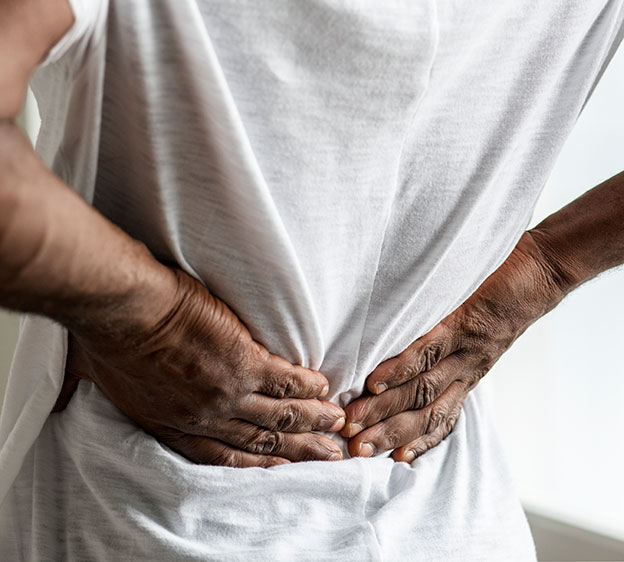What Does a Herniated Disc Feel Like? Symptoms, Causes and Treatment
October 18, 2024Categories: Orthopedics

A herniated disc can be an overwhelming experience, especially if you’re unsure what’s happening or how to manage the pain. It can register as a sharp, intense pain that may travel through various parts of the body. If you or someone you know is struggling with this condition, knowing what a herniated disc is, what causes it and what treatment options are available can help.
What is a Herniated Disc?
Between the bones in your spine are small, cushion-like discs that act as shock absorbers, allowing flexibility and movement. A herniated disc occurs when the soft, jelly-like interior of one of these discs pushes through a tear in the outer layer. This can put pressure on surrounding spinal nerves or the spinal canal, leading to pain and other common symptoms.
Read More: Neck and Back Pain: Causes and Treatment
Common Symptoms of a Herniated Disc
The symptoms of a herniated disc can vary, depending on the location of the herniation and which nerves are affected. Symptoms may include:
- Back muscle spasms: Sudden and intense muscle contractions can cause discomfort and stiffness in the back area.
- Bladder or bowel issues: If a herniated disc compresses nerves that control the bladder or bowel, it may result in incontinence.
- Chronic neck or back pain: The most prevalent symptom of a herniated disc is often described as a persistent or intense pain, often in legs, neck or lower back. When a disc herniation occurs in the lower back, the pain might extend down your legs, causing discomfort and making movement difficult.
- Diminished reflex response: Knee or ankle use may become difficult.
- Numbness or tingling: A herniated disc can lead to numbness or tingling sensations in the affected nerves, particularly in the arms, legs or buttocks.
- Leg muscle weakness: A noticeable loss of strength in leg muscles can occur, affecting mobility and stability.
- Sciatica: Pain originating from the lower back or buttocks, can radiate down the leg, sometimes reaching the thigh, calf, foot or toes.
What Does a Herniated Disc Feel Like?
A herniated disc is usually described as sharp, intense and radiating. The pain generally starts in the back but can extend to other areas, particularly down the arm or leg. The sensation can vary from a dull ache to burning or stabbing pain. You might also notice:
- Difficulty standing or walking because of leg pain or weakness.
- Sharp pain that travels down the spinal nerves.
- Weakness or numbness in the arms or legs, depending on the location of the herniated disc.
“A herniated disc can cause many symptoms that can mimic other issues,” says Dr. Andrew Castro, board-certified orthopedic spine surgeon at Beaufort Memorial. “So, it’s important to know the signs and talk to your primary care provider about what you’re experiencing so you get an accurate diagnosis and the treatment you need.”
How Does a Herniated Disc Affect the Body?
When a herniated disc occurs, the displaced material from the disc can compress nearby nerves, including the spinal cord in more severe cases. The result can be:
- Loss of function: Nerves compressed by the disc might impair movement, causing muscle weakness.
- Pain while sitting: Sitting can worsen the pain because it increases pressure on the discs in the lower back.
- Radiating pain: This pain travels along the path of the affected nerve, often reaching the arms or legs.
Diagnosing a Herniated Disc
If you suspect a herniated disc, your primary care provider will likely conduct a physical exam to assess your symptoms. This includes testing reflexes, muscle strength and the ability to move.
“If further investigation is needed, imaging tests such as a CT scan or MRI may be used to confirm the diagnosis and determine the exact location of the herniation,” Dr. Castro says.
Read More: How to Find Immediate Relief for Sciatic Pain
Treatment Options for a Herniated Disc
The good news is that herniated discs often improve over time with conservative treatments. Here are some of the most common options:
- Epidural injections: In some cases, steroid injections into the area around the herniated disc can reduce inflammation and relieve pressure on the nerve, offering relief from pain.
- Muscle relaxers: Muscle spasms can sometimes accompany a herniated disc. Your provider may suggest muscle relaxers and other non-benzodiazepine antispasmodics to help alleviate these painful contractions.
- Pain relievers: Over-the-counter pain relievers like ibuprofen or acetaminophen can help reduce pain and inflammation. For more severe pain, prescription medications might be needed.
- Physical therapy: Physical therapy plays a crucial role in managing a herniated disc. A physical therapist can guide you through exercises to strengthen the muscles around your spine and improve. Stretching and strengthening the core muscles can help support the spine and prevent future injuries.
- Surgery: Although most people don’t need surgery for a herniated disc, it may be an option if the pain persists or if there is significant compression of the spinal cord or nerve roots. Certain conditions, including myelopathy and radiculopathy, can be caused by a herniated disc. Spinal decompression surgeries may help relieve pressure in the spine.
“The goal of surgery is to remove part or all of the herniated disc material to relieve pressure on the nerves,” Dr. Castro says. “If a patient doesn’t respond well to other treatment options, surgical intervention is the next step.”
Read More: Help for Back and Neck Pain: Is Surgery Always Necessary?
Preventing a Herniated Disc
While some causes of a herniated disc — such as aging — are unavoidable, there are steps you can take to reduce your risk:
- Exercise regularly: Strengthening the muscles that support your spine, particularly the core muscles, can help reduce your risk of disc injuries.
- Lift properly: When lifting heavy objects, use your legs rather than your back to prevent injury.
- Maintain a healthy weight: Carrying excess weight can increase strain on your spine.
- Practice good posture: Avoid slouching when sitting or standing to reduce unnecessary pressure on your discs.
- Stop nicotine use: Smoking or using other forms of nicotine increases your risk of a herniated disc.
A herniated disc can cause significant discomfort and interfere with daily activities. Understanding what a herniated disc feels like and the symptoms it causes is the first step toward relief. If you think you’re experiencing the signs of a herniated disc, don’t hesitate to reach out to your primary care or orthopedic provider. Early diagnosis and treatment can lead to faster recovery and prevent long-term complications.
If you’re dealing with back pain, request an appointment with an orthopedic specialist.

